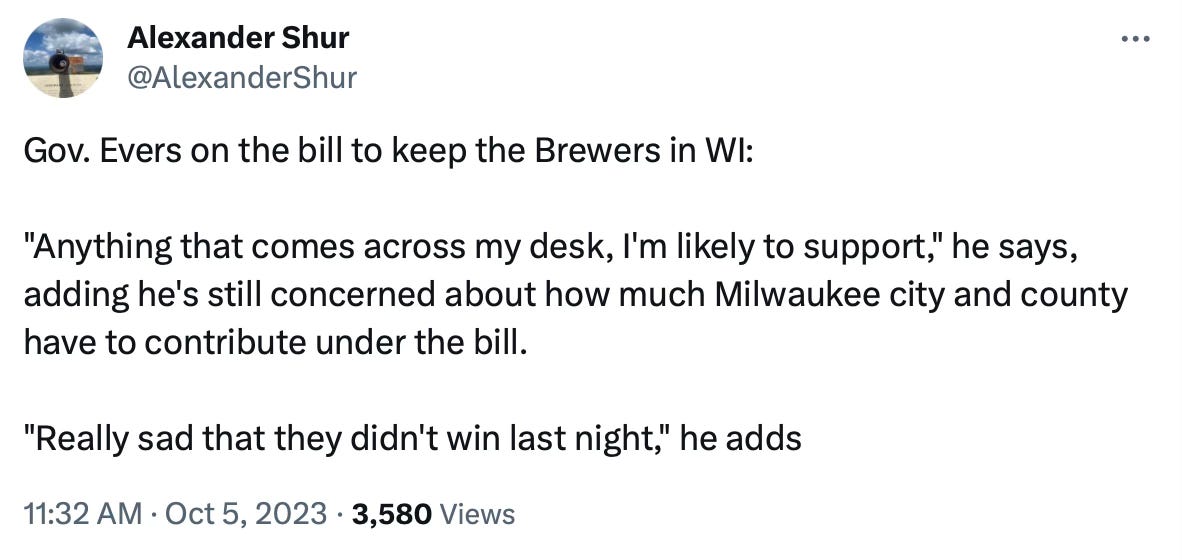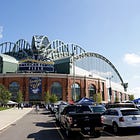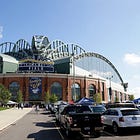The Brewers stadium deal and a complicated question
Should lawmakers back the bill to spend more than $545 million in public dollars for maintenance and upgrades at American Family Field?
The Recombobulation Area is a ten-time Milwaukee Press Club award-winning weekly opinion column and online publication written, edited and published by longtime Milwaukee journalist Dan Shafer. Learn more about it here.

The Wisconsin State Legislature is set to vote on a mammoth package to fund maintenance and upgrades at American Family Field, keeping the Brewers in Milwaukee for several more decades.
So, is it a good deal? It’s complicated.
It’s complicated because it’s unclear why this has become such an urgent and pressing matter, with seven years left on the team’s lease at the stadium. It’s complicated because state Republicans’ proposal is so much more expensive than what the governor initially proposed — which seemed like too much at the time. It’s complicated because the state just months ago passed sweeping reform to a broken shared revenue system that had been pointedly defunding Milwaukee, and this deal goes right back into Milwaukee’s pockets to peel off some of that new funding to go toward the ballpark instead of the basic city and county services that it was intended to. It’s complicated because the Brewers have stubbornly refused to entertain the option of encouraging economic development around the ballpark, even so many other new stadium developments are seeking that as an option (and there are more parking spaces around AmFam Field than at Disney World in Florida). It’s complicated because the former funding source for the ballpark — the five-county stadium tax — sunsetted just three years ago, and the new deal doesn’t tax wealthier suburban counties, even as they benefit from the stadium and the majority of Brewer game attendees come from outside Milwaukee County. It’s complicated because the state government, not the team, owns American Family Field. It’s complicated because of the simple reality that using public funds to fund professional sports facilities is not the best use of taxpayer dollars.
It’s also complicated because the deal itself is complicated.
As it stands, the funding piece of the deal is this:
$411 million in state funding
$135 million in local funding, split between the City of Milwaukee and Milwaukee County
$100 million from the Milwaukee Brewers
With amendments, the deal also now involves a modification in the way local sales tax are collected through the state Department of Revenue and an amendment to Act 12 that allows a technical change on local spending on retirement services, both of which are especially important to the local governments involved, which is a big reason why you saw Mayor Cavalier Johnson and County Executive David Crowley voice support for the deal. The latest amendments also include a “pathway to development,” creating a “working group” to study potential options for what can be done in areas surrounding the stadium — a goal Johnson in particular has advocated for.
This is indeed a complicated deal, but complexity in legislation like this is not inherently a bad thing. The deal to fund the construction of Fiserv Forum was also complicated, and I’d argue — and did at the time — that it was a good deal and one worth supporting.
A few weeks ago at Milwaukee Record, I wrote a breakdown of the AmFam Field proposal and Fiserv Forum deal. While both deals involve contributions at the state, county and city level, the Fiserv Forum deal is a much, much better one — and one we should be doing a better job to learn from.
For one, the overall dollar figure of total public funding is significantly larger for the Brewers deal. In fact, there is more public funding in the proposal for AmFam Field than the total cost to build Fiserv Forum – $546 million in public-only dollars for AmFam to $527 million private and public dollars combined for Fiserv. That’s a big difference!
And the private contribution from the Brewers is much, much smaller than what Bucks ownership and former team owner Sen. Herb Kohl had put up — $274 million for the current and former Bucks owners and just $100 million for the Brewers. Bucks ownership unquestionably did more to fund their deal than what Brewers ownership is proposing to do, both in the amount of funding committed and the larger goals of catalytic transformation. That’s certainly a factor in whether or not to support this bill.
Comparing just the public side of each funding package, the Fiserv Forum one is a better one for taxpayers, too. The Bucks deal relies heavily from the special sales taxes that fund the Wisconsin Center District (WCD), which the arena is now essentially a part of — taxes on car rentals, hotel rooms, and some food and beverage sales. Nothing like that is a part of the Brewers deal, and while backers will not-incorrectly boast that the Brewers deal creates no new taxes, it instead siphons from the existing — and newly created — tax structures that go to fund greater community needs, particularly in Milwaukee, where the city just set an optimistic timeline of 20 years to replace its lead pipes (without state help, of course).
A $2 ticket surcharge was a crucial component of the Bucks deal, and is projected to bring in $60 million over the course of the 30-year lease agreement. Something similar is currently absent from the Brewers deal. There’s been talk of an amendment that would add a surcharge, but only for non-Brewers events, for which there aren’t all that many, and it wasn’t added to the Assembly version of the bill.
It’s possible that could change if and when it reaches the State Senate. State Senate President Chris Kapenga (R-Delafield) said in a recent interview on WISN’s UpFront that he would back a surcharge on all events, including Brewers games, but Kapenga is also someone who seems unlikely to back the deal in any form. He also voted against the Fiserv Forum deal.
Which brings us to the political dynamics at play. While Gov. Evers’ proposal was very different than what Republicans introduced, the Democratic governor has signaled that he is on board with what’s making its way through the legislature. Amendments appear to have won over City and County leaders. In the legislature, however, this deal will require Democratic votes in order for it to pass — just as was the case for the Fiserv Forum deal. It’s always interesting when policies don’t contort to your typical partisan divide – for example, the Fiserv Forum deal was one that had the backing of both then-State Rep. Mandela Barnes and then-Gov. Scott Walker.
So now, even though Republicans operate with sizable, gerrymandered majorities and could pass virtually any proposed bill with a simple majority vote, not all Republicans are going to support this deal, giving legislative Democrats a rare bit of leverage that they rarely see in the legislature’s current makeup.
State Rep. Evan Goyke of Milwaukee, an influential member of the Democratic caucus and previously a longtime member of the state legislature’s budget-writing committee, was among those Milwaukee Democrats to vote in favor of the Fiserv Forum deal in 2015. But in a newsletter to constituents late last week, he said he “approached this issue with the hopes of supporting the deal” but said despite positive changes that, “I cannot support it.”
The thing is, this deal is so close to being one worthy of support.
Reducing the local contribution is good. Negotiating a sales tax collection fix and other technical changes that will help the City and County of Milwaukee in the long term is a very strong add-on. Providing a “pathway to development” marks progress toward eventually creating more development around the stadium, along the lines of the “Beer District” we’ve advocated for here at The Recombobulation Area.
But does “better” mean “good”?
Unfortunately, I must say no.
I want to support this deal, and there are pieces of it that genuinely are quite good, but overall, this is not a piece of legislation that lawmakers should vote in favor of in its current form.
There are several reasons why. For one, the overall amount of public funding in the deal is simply too high. It has never made sense why Evers’ $290 million proposal ballooned to $546 million when Republicans introduced their bill, and it has never made sense why Brewers ownership would not contribute anything close to the more even public-private funding split we saw with Fiserv Forum.
The local component of this deal, in particular, has been perplexing from its first pitch. This is perhaps the most distressing piece of the package.
It has never made sense why Milwaukee is the only local government to contribute funding, and why wealthier suburban communities are omitted entirely after previously contributing in the five-county stadium tax. And for the state to come right back after Milwaukee’s pockets after finally — finally! — agreeing to a long-overdue shared revenue and local sales tax deal that helped pull the City and County back from a state-created brink of bankruptcy is beyond frustrating. Local officials from both the County Board and Common Council have voiced opposition to this, but as the Legislative Reference Bureau confirmed to The Recombobulation Area, this state legislation would not require any votes on the local level, so there’s no functional way for that voiced opposition to manifest into actual votes that would impact the end result.
There’s also no real reason to do this now, with seven years left on the Brewers’ lease at American Family Field.
The stadium district also has additional financial assets on its balance sheet in the form of treasury bonds worth in the neighborhood of tens of millions of dollars, which could help meet any short-term financial obligations, a source tells The Recombobulation Area.
While there are significant implications at play that may lend credence to arguments to get this done quickly, the priority should be to get this done right.
It can get done right, though. This deal can get to a place where it is worthy of our full-throated support. It’s really not that far off, either.
Those who are opposed outright to any kind of a deal on this are playing political games, too, because the reality is that the state owns the stadium and will at some point need to take action to address the Brewers’ long-term future in Milwaukee. Doing nothing and allowing the team to skip town, leaving the stadium in a state of disrepair with no primary tenant, would be a tremendously bad outcome.
Those who have been the legislature’s most ardently anti-stadium funding voices — Democratic State Sen. Chris Larson of Milwaukee, most vocally — have done a poor job of making their case against the stadium deal, obscuring the reality of the situation and adhering to ideological opposition instead of seeking to take steps to improve the legislation.
Because there is a path to improving this legislation, and that should still be the priority right now.
If we can learn from the Fiserv Forum deal, adding a ticket surcharge for all events should be a no-brainer. The financial burden to fund the stadium should be borne more by those who pay to attend games. A fiscal estimate of what that could generate is something the State Senate should seek if and when this bill reaches the upper chamber. A ticket surcharge would probably be best utilized to lower the local contribution, but could also go toward reducing the state’s — which could stand to be lower regardless.
As for the local side, if Milwaukee is being forced to commit local dollars, surrounding counties should be required to do so at some level, as well — particularly given the stadium’s location, essentially right on the city’s border. Even if additional local funding is not at the same level as Milwaukee, there should be some funding from local governments within the metro region in some capacity. Counties like Waukesha and Ozaukee could certainly afford it.
Milwaukee’s contributions have been reduced as negotiations have unfolded, yes, but that has occurred under somewhat misleading pretenses. That initial $200 million number for what Milwaukee — City and County, combined — would contribute to the deal was never going to be that high, and was clearly artificially inflated to feed a media narrative that the local dollars would be lowered, giving the appearance of granting concessions to local stakeholders. Milwaukee is still being required to pay more than it should, and for less bang for its buck than the Fiserv Forum agreement, which had goals of direct transformational impact that the Brewers deal still lacks.
The local contributions to the Bucks deal were quite different. A piece of it similarly involved shaving off part of the County’s shared revenue, but both the County’s $1 land sale for the vacant Park East parcels and in the City-approved — and voted on — tax incremental financing (TIF) agreement, those created the type of catalytic impact that these stadium deals purport to create. The city’s portion deal directly created the Deer District, which I’d argue has been a true success story, both in the immediate impact of what creating it has brought about, and the long-term incentive of having these developments eventually generate property tax revenue that would go to benefit the entire city.
An addition of a “pathway to development” is a good start, but the newly required study doesn’t go nearly far enough to make an investment of this scale truly worthwhile. This deal can and should include a similarly creative approach to foster direct development for the west side of Milwaukee the same way Fiserv Forum and the Deer District have been for the west side of downtown. The Brewers should commit to building something along the lines of the “Beer District,” and lawmakers should make this a requirement of the deal.
Public support has been coming around in favor of a better utilization of space around the stadium, and it remains puzzling that the MMAC and other business community entities that have backed the stadium deal haven’t embraced the very economic development an investment like this purports to generate. It would be a huge mistake to leave the surrounding neighborhoods looking the same at the outset of this deal as it does at the end of it, in 2050. We’re not going to change Milwaukee or grow Milwaukee if we keep doing the same things over again. The lack of creativity in the current American Family Field deal remains perplexing.
This moment with today’s Assembly’s floor session vote brings a difficult decision to state lawmakers, but shouldn’t be seen as the bottom of the 9th, but rather, something more like the 7th inning stretch. The deal is close, and will almost certainly pass in the Assembly. The Senate vote might be closer, but it should pass there, too.
But before this rounds the bases, we need to get up out of our seats for a minute, take a step back, and see if this really is the path to a win for Milwaukee and Wisconsin. Because right now, there are too many problems with the deal to cement it in legislation for a generation to come.
This deal has already improved substantially after one public hearing and a series of amendments. That momentum should continue. More progress can still be made. Let’s keep at it, put some insurance runs on the board, and close this thing out right.
The Brewers’ future in Milwaukee can be secured for decades to come in a way that truly benefits the city, region and state, and learns from the success of the Fiserv Forum deal. This future is within our grasp.
The deal is complicated, as are so many of the issues surrounding it, but the bottom line is simple: This deal, as currently constructed, is not a home run. It should not pass until it is.
Dan Shafer is a journalist from Milwaukee who writes and publishes The Recombobulation Area. He’s also written for The New York Times, The Daily Beast, Heartland Signal, Belt Magazine, WisPolitics, and Milwaukee Record. He previously worked at Seattle Magazine, Seattle Business Magazine, the Milwaukee Business Journal, Milwaukee Magazine, and BizTimes Milwaukee. He’s won 17 Milwaukee Press Club Excellence in Journalism Awards. He’s on Twitter at @DanRShafer.
Subscribe to The Recombobulation newsletter here and follow us on Facebook and Instagram at @therecombobulationarea.
Already subscribe? Get a gift subscription for a friend!
Follow Dan Shafer on Twitter at @DanRShafer.
#BucksInSix








I’ll be honest, I respect Larson even more for his ideological stance on public funding of stadiums. Public funding of stadiums is, for lack of a better term, horseshit. Billionaires dictating a taxpayer welfare check and threatening to leave. There should be federal legislation blocking public funding of things like this. The stadium being state-owned, however, makes it so there must be a replacement plan.
It's become a pressing matter because the team floated leaving to test the waters on whether or not the community wants to keep them, and there's no proof that it does until something passes. Money talks BS walks
The end of the 5-county tax was a stupid thing to have happen.
I think that, given the usual surplus of low priced tickets on the secondary market, a ticket tax undercuts the team's goal of being seen as inexpensive family-friendly entertainment (though they really should take a cue from Atlanta on concession prices...) IIRC they're somewhat in the middle right now relative to the rest of the league and I imagine they don't want to move too far in either direction in that list.
There's a demand to find a balance between "generating economic activity" (i.e. hoovering every last penny from game attendees) and being seen as nickel-and-diming them to death. It's not easy, I admit
Though Larson is about losing my vote in the next election if he keeps tilting at this windmill the way he is now. I'm one more Twitter whine away from unfollowing him.